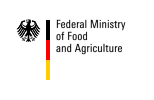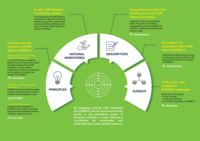Extension of EURISCO for Crop Wild Relatives (CWR) in situ data and preparation of pilot countries’ data sets
Short title: CWR in EURISCO

| The project CWR data in EURISCO is funded by the German Federal Ministry of Food and Agriculture. |
Activity Coordinator: ECPGR Secretariat
- Project proposal (309,9 KB)
- Budget revision and request of extension (54,2 KB) (February 2024)
Highlights
Principles for the Inclusion of CWR Data in EURISCO
Prepared by Theo van Hintum and José Iriondo
Template for in situ CWR passport data in EURISCO
MS Excel template to be used by In Situ National Inventory Focal Points for upload to EURISCO of CWR population data
Project brochure
This brochure showcases the CWR in EURISCO project, its key results and outputs – including country-by-country achievements.
CWR in EURISCO video
Project partners
| Albania, Agricultural University of Tirana |
| Bulgaria, Institute for Plant Genetic Resource, Sadovo |
| Cyprus, Agricultural Research Institute, Lefkosia |
| Czech Republic, Crop Research Institute, Gene Bank, Prague, Czech Republic |
| Georgia, LEPL Scientific Research Center of Agriculture, Tbilisi |
| Germany, Information and Coordination Centre for Biological Diversity (IBV), Bonn; and Leibniz Institute of Plant Genetics and Crop Plant Research (IPK), Gatersleben |
| Italy, Istituto di Bioscienze e Biorisorse (IBBR-CNR), Bari; Department of Agricultural, Food and Environmental Science, University of Perugia; and Council for Agricultural Research and Economics, Research Centre for Forestry and Wood (CREA-FL), Trento |
| Lithuania, Nature Research Centre, Vilnius |
| North Macedonia, Department of Genetics and Plant Breeding; Faculty of Agricultural Sciences and Food Ss Cyril and Methodius University, Skopje |
| The Netherlands, Centre for Genetic Resources (CGN), Wageningen |
| Poland, Plant Breeding and Acclimatization Institute – National Research Institute (IHAR-PIB), Radzików |
| Portugal, Banco Português de Germoplasma Vegetal - Instituto Nacional de Investigação Agrária e Veterinária (BPGV-INIAV), Braga |
| Romania, Banca de Resurse Genetice Vegetale, Suceava |
| Slovakia, Research Institute of Plant Production, Piešťany |
| Slovenia, Agricultural Institute of Slovenia, Ljubljana |
| Spain, Universidad Rey Juan Carlos, Madrid |
| United Kingdom, University of Birmingham |
Timeframe
20 Dicember 2021 – 31 December 2024
Implementation
Summary of reports
| Country | 2023 | 2024/2025 |
| Albania | Report (1,3 MB) | Report (2,7 MB) |
| Bulgaria | Report (174,0 KB) | Report (197,2 KB) |
| Cyprus | ||
| Czech Republic | Report (2,9 MB) | Report (5,0 MB) |
| Georgia | Report (1,2 MB) Passport data | |
| Germany | Report (971,6 KB) | |
| Italy | Report (1,9 MB) | Report (1,5 MB) |
| Lithuania | Report (1,5 MB) | Report (588,5 KB) List of CWR sent to EURISCO |
| The Netherlands | Report (214,7 KB) | |
| North Macedonia | Report (483,0 KB) Passport data | |
| Poland | Report (379,0 KB) | |
| Portugal | Report (907,0 KB) | Report (2,2 MB) |
| Romania | Report (244,8 KB) List of CWR populations | |
| Slovakia | Report (2,2 MB) | |
| Slovenia | Report (2,2 MB) | |
| Spain | Report (1,0 MB) | |
| United Kingdom | Report (2,1 MB) |
November 2025
A brochure summarizing the main achievements of the project is now available here
October 2025
The final report (2,7 MB) and passport data from Albania are now available
August 2025
The final reports from North Macedonia (483,0 KB), Portugal (2,2 MB), Slovakia (2,2 MB) and Slovenia (2,2 MB) are now available.
March 2025
The final report (1,2 MB) and passport data from Georgia are now available.
February 2025
The final report (1,5 MB) from Italy is now available.
January 2025
The final report (5,0 MB) and in situ CWR population passport data for the Czech Republic are now available, as well as the final report (379,0 KB) and list of priority CWR (187,9 KB) from Poland, the final report (588,5 KB) and list of CWR sent to EURISCO from Lithuania, and the final report (197,2 KB) from Bulgaria.
December 2024
The final report (244,8 KB) and list of in situ CWR populations for Romania are now available.
June 2024
A project meeting took place in Sadovo, Bulgaria, on 18-19 June 2024 [more information].
February 2024
The project was extended until 31 December 2024, accompanied by a supplementary budget allocation of €69,997, and additional partners will join the project.
The EURISCO Coordinator S. Weise held an online training session with representatives of the pilot countries.
January 2024
In situ CWR data from Bulgaria, Cyprus, Germany, Italy, the Netherlands and Spain can now be searched on EURISCO. Data from additional pilot countries involved in the project will be soon made available.
November-December 2023
An online meeting of the project partners was held on 12 December 2023 [more information]
Final technical reports are available for Albania (1,3 MB), Bulgaria (174,0 KB), Cyprus (867,3 KB) (selected taxa here and list of CWR sent to EURISCO here), the Czech Republic (2,9 MB) (passport data available here), IPK (971,6 KB), Italy (1,9 MB), Lithuania (1,5 MB) (together with the Lithuanian CWR priority list), the Netherlands (214,7 KB), Portugal (907,0 KB) and Spain (1,0 MB).
May 2023
The project interim report is available [here (611,3 KB)]. The individual interim partner/country reports are also available: Albania (1,7 MB), Bulgaria (137,8 KB), Cyprus (124,5 KB), Czech Republic (2,5 MB), IPK (410,8 KB), Italy (1,0 MB), Lithuania (1,1 MB), the Netherlands (117,9 KB), Portugal (602,0 KB), Spain (1,0 MB)and the United Kingdom (2,1 MB).
December 2022
Project partners met on 15 December in a session dedicated to CWR data in EURISCO during the ad hoc Crop Wild Relatives Working Group meeting, which took place in Thessaloniki, Greece. The agenda, list of participants, minutes and presentations can be found [here]
May 2022
The proposal setting the principles for the inclusion of CWR data in EURISCO, prepared by Theo van Hintum and José Iriondo, was agreed by the project partners and the EURISCO Advisory Committee. Download Principles for the Inclusion of CWR Data in EURISCO
February 2022
A draft proposal setting the ‘Principles for the Inclusion of CWR Data into EURISCO’ has been circulated among the project partners and the EURISCO Advisory Committee
December 2021
The project was approved by the German Federal Ministry of Food and Agriculture. For more information read here
Meetings
3rd meeting - Sadovo, Bulgaria, 18-19 June 2024
Summary
A meeting of the project partners was held on 18-19 June in Sadovo, Bulgaria, organized in collaboration with the Institute of Plant Genetic Resources (IPGR). The ECPGR Secretary, L. Maggioni, and the EURISCO coordinator, S. Weise, summarized the project objectives and 2023 achievements, with the agreed principles for transferring data from national inventories to EURISCO. The new extension of EURISCO, agreed descriptors, data upload mechanism, and the new web interface were described. Further improvements in search and download functionalities are planned.
Project partners from Albania (online), Bulgaria, Germany (online), Italy, Lithuania, the Netherlands (online), Portugal, Spain and the United Kingdom (online) presented their progress and shared their experiences (see presentations). Overall, by August 2024, seven countries (Albania, Bulgaria, Cyprus, Germany, Italy, the Netherlands and Spain) have provided CWR data to EURISCO, for a total of 3,035 populations data.
Considering that the German Ministry for Food and Agriculture granted an extension of the project until December 2024, with an additional budget of ca. € 70,000, new partners from Georgia, Poland, Romania and Slovenia were invited to join the project. They presented their countries’ activities for CWR conservation and documentation and their plans to provide CWR in situ data to EURISCO within the next six months (see presentations). Agreements were made between the ECPGR Secretary and all the partners for work plans to be implemented with the project’s support. A specific discussion focused on the usefulness of adding one state to the descriptor CONSACTION (Conservation action in place), to enable adding information about populations managed as part of a genetic reserve. Principles and procedures to assign DOIs to the CWR in situ populations were also discussed. Guidelines to inform data providers on suggested options and procedures will be drafted and publicized.
Agenda (246,7 KB) | List of participants (556,6 KB)
Presentations
- Introduction - L. Maggioni (588,7 KB)
- Taking stock of the new EURISCO extension for in situ CWR data. How to use it, how to improve it - S. Weise (2,2 MB)
- Discussion on the procedure for assignment of DOIs to wild populations - J. Iriondo & S. Weise (732,5 KB)
- Proposal for adding a new value to the descriptor CONSACTION - J. Iriondo (181,5 KB)
| Results of project partners' activities | Presentations of new partners |
|
2nd meeting: online, 12 December 2023
The meeting was dedicated to updating on the progress made and to exchanging views and experiences regarding the selection of in situ populations to be uploaded on EURISCO. The main conclusions were that the selection of populations very much depends on each country's context and approach. The overall principle remains valid that populations need to be available to users “in principle”. This means that it is not advisable to include those populations that are so strictly protected by local legislation as being certainly unavailable for use. It was also observed that the inclusion of actively conserved populations is a possible option (either being specifically conserved and managed in genetic reserves, or informally conserved as being part of other types of protected areas). It is however also reasonable to include a selection of non-protected, non-managed, widely distributed crop wild relative populations, which may not require active conservation but may be of interest to potential users. Other topics were discussed, such as the need to back up in situ populations as ex situ samples. This practice is especially advisable for threatened populations, as well as for facilitating the transfer of material to users. It was also acknowledged that the cost of collecting and maintaining CWR populations ex situ would not be affordable for all the populations that may be of interest to users and ad hoc seed procurement could be a valid option in many cases. Strategies to involve a network of data providers and obtain collaboration and integration of efforts of different ministries and local authorities were touched on. A more detailed discussion of these and other aspects of the project was postponed in view of a potential physical meeting that the Secretariat will try to organize next year in March/April, depending on budget availability. The Bulgarian partner kindly offered to host the meeting.
The presentations and video recording of the meeting are available below.
Presentations
- Overview of the project - L. Maggioni, ECPGR Secretary (673,8 KB)
- In situ CWR populations in EURISCO – update – S. Weise (1,1 MB)
- Bulgaria – K. Uzundzhalieva (206,4 KB)
- Germany – S. Sensen (1,1 MB)
- Lithuania – J. Labokas, D. Uogintas (4,6 MB)
- United Kingdom - N. Maxted (1,4 MB)
Recording
1st meeting: Thessaloniki, Greece, 15 December 2022
More information about this meeting, including agenda, list of participants and presentations, can be found [here]



